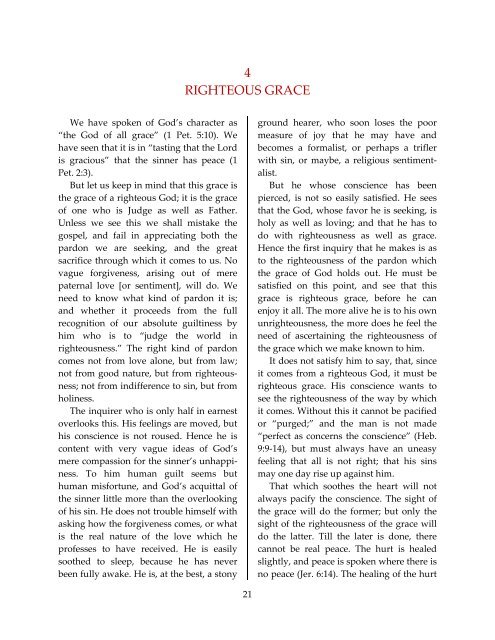God's Way of Peace by Horatius Bonar, D.D.
The seasoned Scottish pastor wrote this short devotional for those suffering from guilt, anxiety, or the consequences of sin. He writes with neither chastisement nor condemnation, but rather immediately directs his readers to Christ’s gift of salvation through his death and resurrection. Bonar reminds all that the Gospel offers hope for the sinner and comfort for the troubled, for God’s perfect, constant grace never fails those who accept it. From Bonar’s time to the present, people have found peace with God afresh through this book. Many people report having read it several times, and turning to it again and again when troubles arise. Kathleen O’Bannon CCEL Staff
The seasoned Scottish pastor wrote this short devotional for those suffering from guilt, anxiety, or the consequences of sin. He writes with neither chastisement nor condemnation, but rather immediately directs his readers to Christ’s gift of salvation through his death and resurrection. Bonar reminds all that the Gospel offers hope for the sinner and comfort for the troubled, for God’s perfect, constant grace never fails those who accept it. From Bonar’s time to the present, people have found peace with God afresh through this book. Many people report having read it several times, and turning to it again and again when troubles arise.
Kathleen O’Bannon
CCEL Staff
You also want an ePaper? Increase the reach of your titles
YUMPU automatically turns print PDFs into web optimized ePapers that Google loves.
GOD’S WAY OF PEACE<br />
4<br />
RIGHTEOUS GRACE<br />
We have spoken <strong>of</strong> God’s character as<br />
“the God <strong>of</strong> all grace” (1 Pet. 5:10). We<br />
have seen that it is in “tasting that the Lord<br />
is gracious” that the sinner has peace (1<br />
Pet. 2:3).<br />
But let us keep in mind that this grace is<br />
the grace <strong>of</strong> a righteous God; it is the grace<br />
<strong>of</strong> one who is Judge as well as Father.<br />
Unless we see this we shall mistake the<br />
gospel, and fail in appreciating both the<br />
pardon we are seeking, and the great<br />
sacrifice through which it comes to us. No<br />
vague forgiveness, arising out <strong>of</strong> mere<br />
paternal love [or sentiment], will do. We<br />
need to know what kind <strong>of</strong> pardon it is;<br />
and whether it proceeds from the full<br />
recognition <strong>of</strong> our absolute guiltiness <strong>by</strong><br />
him who is to “judge the world in<br />
righteousness.” The right kind <strong>of</strong> pardon<br />
comes not from love alone, but from law;<br />
not from good nature, but from righteousness;<br />
not from indifference to sin, but from<br />
holiness.<br />
The inquirer who is only half in earnest<br />
overlooks this. His feelings are moved, but<br />
his conscience is not roused. Hence he is<br />
content with very vague ideas <strong>of</strong> God’s<br />
mere compassion for the sinner’s unhappiness.<br />
To him human guilt seems but<br />
human misfortune, and God’s acquittal <strong>of</strong><br />
the sinner little more than the overlooking<br />
<strong>of</strong> his sin. He does not trouble himself with<br />
asking how the forgiveness comes, or what<br />
is the real nature <strong>of</strong> the love which he<br />
pr<strong>of</strong>esses to have received. He is easily<br />
soothed to sleep, because he has never<br />
been fully awake. He is, at the best, a stony<br />
ground hearer, who soon loses the poor<br />
measure <strong>of</strong> joy that he may have and<br />
becomes a formalist, or perhaps a trifler<br />
with sin, or maybe, a religious sentimentalist.<br />
But he whose conscience has been<br />
pierced, is not so easily satisfied. He sees<br />
that the God, whose favor he is seeking, is<br />
holy as well as loving; and that he has to<br />
do with righteousness as well as grace.<br />
Hence the first inquiry that he makes is as<br />
to the righteousness <strong>of</strong> the pardon which<br />
the grace <strong>of</strong> God holds out. He must be<br />
satisfied on this point, and see that this<br />
grace is righteous grace, before he can<br />
enjoy it all. The more alive he is to his own<br />
unrighteousness, the more does he feel the<br />
need <strong>of</strong> ascertaining the righteousness <strong>of</strong><br />
the grace which we make known to him.<br />
It does not satisfy him to say, that, since<br />
it comes from a righteous God, it must be<br />
righteous grace. His conscience wants to<br />
see the righteousness <strong>of</strong> the way <strong>by</strong> which<br />
it comes. Without this it cannot be pacified<br />
or “purged;” and the man is not made<br />
“perfect as concerns the conscience” (Heb.<br />
9:9‐14), but must always have an uneasy<br />
feeling that all is not right; that his sins<br />
may one day rise up against him.<br />
That which soothes the heart will not<br />
always pacify the conscience. The sight <strong>of</strong><br />
the grace will do the former; but only the<br />
sight <strong>of</strong> the righteousness <strong>of</strong> the grace will<br />
do the latter. Till the later is done, there<br />
cannot be real peace. The hurt is healed<br />
slightly, and peace is spoken where there is<br />
no peace (Jer. 6:14). The healing <strong>of</strong> the hurt<br />
21

















